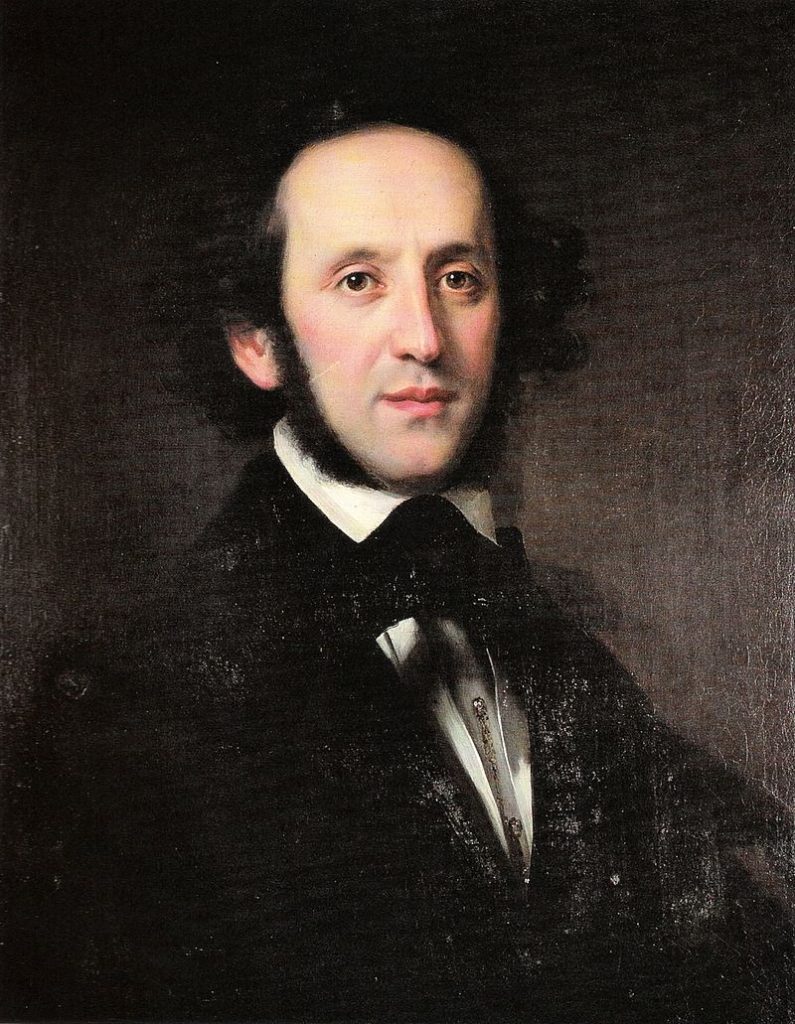Table of Contents
Introduction
In this article I would like to talk to you about the figure of Felix Mendelssohn (1809-1847) and his relationship with the works of Johann Sebastian Bach. The Hamburg-born composer is sometimes associated with Mozart for the precocity of his talent, and we know that he was admired by almost all his contemporaries, in particular by Robert Schumann.

The Style
Mendelssohn’s main characteristic is that of knowing how to combine the characteristics of Classicism and Romanticism under a completely original style, maintaining the compositional procedures of the first while also integrating the stylistic novelties of the second. The most evident trace of this daring and successful synthesis is in his more mature works: think for example about the use of the sonata form and the motif elaboration, typically eighteenth-century procedures, in the Overture from Ein Sommernachtstraum, which are accompanied by sections rich in colours, sometimes for octaves, which are typically nineteenth-century procedures; or the Overture in B minor The Hebrides, fully romantic as it was conceived as a composition in its own right. This composition was not to prelude to an opera but represented, according to the use of Romanticism, a piece of orchestral repertoire. In his early compositions, on the contrary, the classicist’s vein prevails, in particular in his five classical symphonies. Many contemporary musicologists expressed themselves on the relationship between Mendelssohn and Romanticism, in particular in Richard Taruskin we find the following, suggestive consideration:
“[…] He never surpassed his precocious young style. […] He remained stylistically conservative […] feeling no need to attract attention with a repertoire of “revolutionary” novelties. Throughout his short career he remained faithful to the musical status quo – namely, the “classical” forms, as they were already codified for some time. His version of Romanticism, already evident in his early works, consisted of a fairly conventional musical “pictorialism.”
Richard Taruskin, 2010.
The Rediscovery Of Bach
The merits that we ascribe to the Hamburg composer are many: first of all, he founded the Leipzig Conservatory; he also was a sensitive intellectual, a cultured humanist, and a prominent musical teacher. But these merits risk taking a back seat if we compare them to one of the most important rediscoveries of the History of Music, that of the works of Johann Sebastian Bach, which were almost unknown when Bach was alive: criticized as stylistically obsolete even by the direct students of the composer of Eisenach, they were rediscovered following the performance of the Passion According to Matthew by Mendelssohn himself, that had such a resounding success as to give a sure direction to the rediscovery of one of the most famous composers of all time. We have news of the fact that the same composer from Hamburg, many years before the performance of the Passion, studied the works of Bach, in particular, his first symphonies bear the traces of his compositional conditioning. The discovery of the Eisenach organist occurred when Mendelssohn was studying with Ludwig Berger, a pupil of Muzio Clementi, who introduced him to Bach and initiated him to his works. You can find below the score of Bach’s work rediscovered by Mendelssohn. If you order it from the banner below, a small part of your purchase will go to support this blog.
Conclusions
For this article on Felix Mendelssohn is all, do not forget to subscribe to our notification form through the scrolling banner that should appear every day, visiting this page. In this way you will receive an email for each new article. We will have the opportunity to deepen the works of the Hamburg composer in the section dedicated to Musical Analysis. Last but not least, you can click on the button at the bottom right of your screen to book a private lesson in Analysis, Music History or Piano. The lesson takes place through Google Meet® and lasts one hour. You can also request a lesson on another of the categories you find in the header of the site, just write to the address metodoleturapianistica@gmail.com and attach a specific request. See you in class, or in tomorrow’s article!
- History Of The Piano – The Fortepiano - July 12, 2022
- Curt Sachs – History Of Organology At a Glance - July 8, 2022
- Giuseppe Verdi – Rigoletto, Il Trovatore, La Traviata - June 29, 2022
